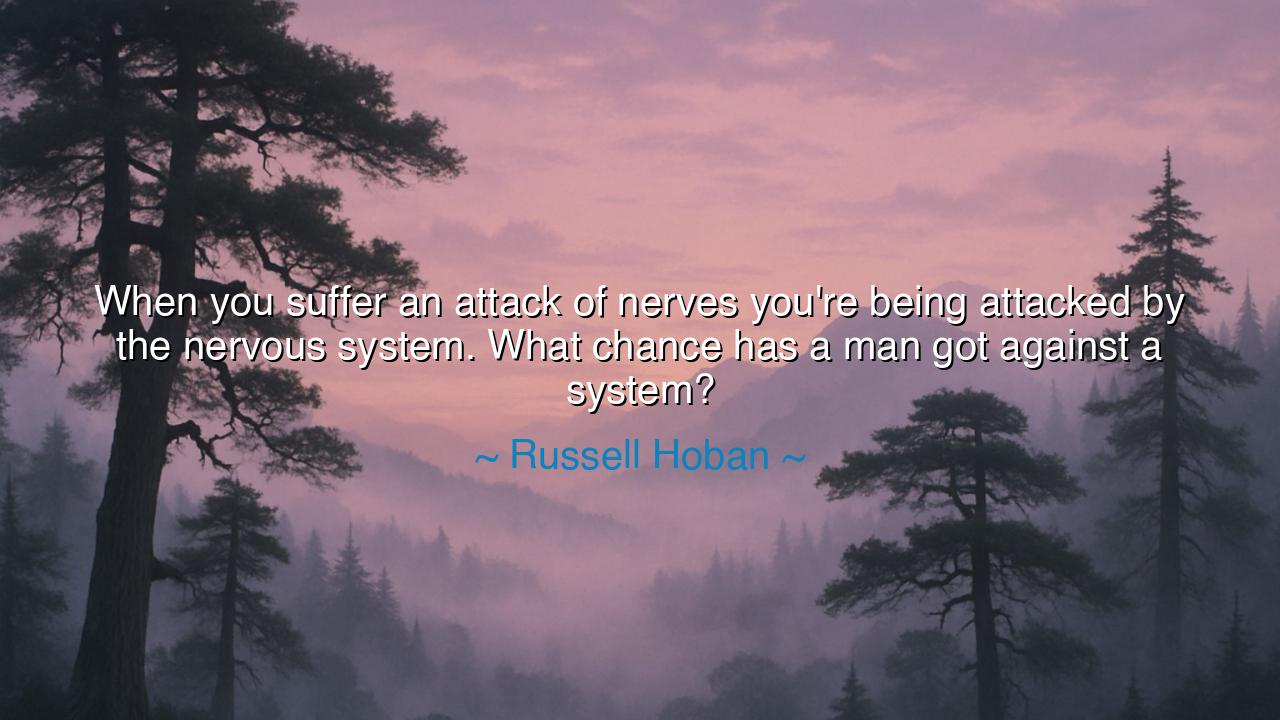
When you suffer an attack of nerves you're being attacked by the
When you suffer an attack of nerves you're being attacked by the nervous system. What chance has a man got against a system?






"When you suffer an attack of nerves you're being attacked by the nervous system. What chance has a man got against a system?" These words, spoken by Russell Hoban, pierce through the veil of everyday life to illuminate the deep internal battle many face when the weight of anxiety and nervousness overcomes them. In these words, Hoban captures the essence of what it feels like to be at the mercy of forces within us—forces that feel larger, more powerful, and more uncontrollable than our own will. The nervous system, that complex web of signals and sensations, can feel like a great system at odds with the very person it should be serving, leaving us vulnerable and powerless in the face of it.
The ancients understood the power of the mind and body. In ancient Greece, the philosopher Hippocrates believed that the body’s health was governed by the balance of the four humors, and any imbalance would cause not only physical ailments but emotional suffering as well. Socrates, too, spoke of the battle between reason and emotion, understanding that the mind and body were deeply interconnected. When the body’s system, whether through anxiety or other disruptions, runs out of balance, it is as though the individual is at war with themselves. This internal conflict, while invisible to others, is no less real than an external battle fought on a field, and it is just as difficult to overcome.
Consider the Roman general Scipio Africanus, who fought tirelessly in the Second Punic War against Hannibal. Scipio faced tremendous pressure—on the battlefield and within his own mind. There were moments when doubt could have overwhelmed him, and the weight of leadership could have fractured his resolve. Yet, despite the intense stress and uncertainty that must have plagued him, Scipio maintained control of his emotions, focusing on the larger strategy and pushing forward to victory. His ability to overcome inner turmoil and instead lead with clear judgment was the key to his success. He did not allow his personal anxieties to dictate his actions, even though the system around him—war, politics, and personal loss—was trying to tear him apart.
Hoban’s statement about the nervous system speaks to the vulnerability we all experience when our inner systems become disrupted. Whether due to pressure, expectations, or fear, we may feel overwhelmed, as though an unseen force is fighting against us. But we can learn, as Scipio did, to navigate these moments with awareness and intentionality. The idea that “what chance has a man got against a system” suggests that, without understanding or control, we are at the mercy of forces beyond our immediate comprehension. Yet, true strength lies in the awareness that these systems, while powerful, are not invincible. Just as a general would study his enemies’ tactics to outmaneuver them, so too can we learn to understand the patterns of our own nervous system and, through practice and self-reflection, find ways to regain control.
Throughout history, leaders have often struggled with the fear and anxiety that come with responsibility. Winston Churchill, during the darkest days of World War II, faced his own internal battles with doubt and depression. Yet, he did not let these feelings define him or dictate his leadership. Instead, Churchill used his personal vulnerabilities to fuel his resolve, famously saying, “When you’re going through hell, keep going.” He recognized that though the system—the weight of war, the pressure of leadership, the fear of failure—seemed overwhelming, the only way forward was through decisive action and resilience. His steadfastness in the face of his own nervousness helped not only him but an entire nation find their strength during one of history’s darkest times.
The lesson Hoban offers is both a warning and a reminder: the forces within us, whether through fear, stress, or anxiety, can feel overwhelming, but we are not entirely powerless in their grip. We must understand that these nervous attacks are temporary and can be managed. Just as Scipio and Churchill mastered the external forces that sought to undermine them, so too can we learn to manage the internal forces that disrupt our peace. By developing self-awareness, by acknowledging the systems within us that cause our anxiety, and by learning techniques to regain control—such as mindfulness, meditation, or simply stepping back to gain perspective—we can navigate our challenges without allowing them to overwhelm us.
Therefore, the practical action we can take is to face the internal systems that often dominate us with courage and understanding. Just as a general studies his enemy, we must study ourselves, acknowledging the sources of our stress and nervousness. Armed with this knowledge, we can better prepare ourselves to handle moments of uncertainty and pressure. And when we are struck by feelings of vulnerability, we can remember that this too shall pass—that we have the strength to endure and move forward. In doing so, we can empower ourselves to be the masters of our own fate, undeterred by the inner systems that would seek to control us.
In the end, Hoban’s words teach us that inner peace is not about eliminating the nervous system’s response, but about learning to navigate its challenges. Just as a great leader faces external battles with strategy and calm, so must we face the internal battles of fear and anxiety with the same resolve. In doing so, we discover that we are capable of far more than we realize—able to lead, not just through our actions, but through our mastery of the very systems that once threatened to control us.






AAdministratorAdministrator
Welcome, honored guests. Please leave a comment, we will respond soon